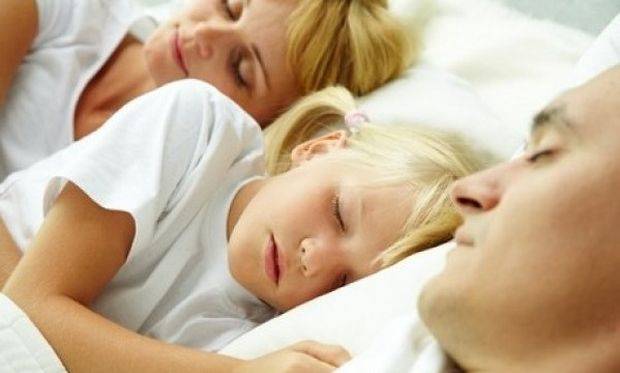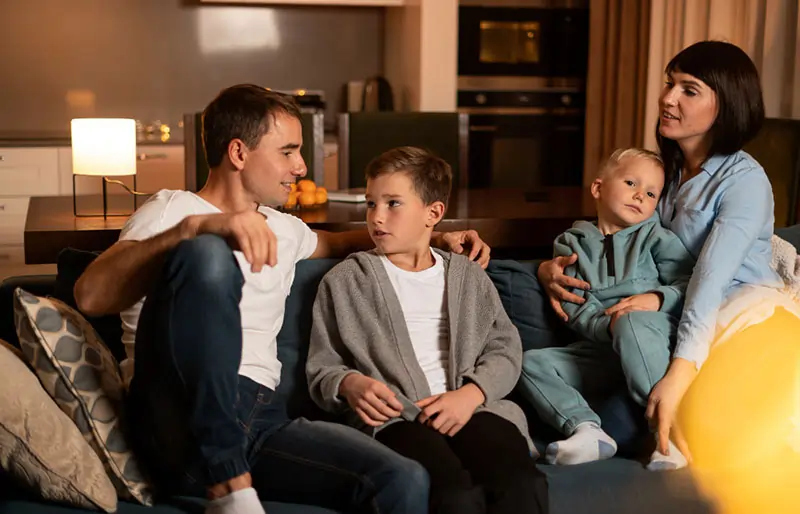Co-Sleeping With An Older Child

Does your teenager or preteen tip toe to your bed at mid night and end up sleeping there till morning? Or is it a practice for you to sleep with children every night, whatever age they are? Studies show that almost 45% of mothers let their preteens sleep with them from time to time, and, perhaps more surprisingly, 13% permit it every night.
Reasons for co-sleeping: behavioral insomnia
Behavioral insomnia is the term used to describe children’s difficulty to fall asleep or stay asleep on their own, making them go to the parents’ bed to sleep every night. Such a condition could be caused by high levels of anxiety, perhaps brought about by higher divorce rates, frequent transitions, more over-scheduling, greater academic pressures, and the influence of being plugged in 24/7.
Reasons for co-sleeping: sub-conscious insecurities
Children growing up in insecure households, and in homes with high degree of instability, children may lack the feeling of being ‘safe’ at night, in the dark. Moreover, television shows and video games that show a high degree of violence may leave lasting images in the mind, which get amplified in the dark. A few children have fears of ghosts and zombies which haunt them when alone.
Reasons for co-sleeping: parents’ emotional needs
Sometimes, it is the parent who feels so sad and lonely that he or she craves the company of the child at night. This, needless to say, is an unhealthy practice. What happens in this case is that even if the child is ready to sleep on his or her own, the parent does not encourage that.
Reasons for co-sleeping: making up for absence
A number of working mothers make up for lost time during the day when they could not be with the child, by sleeping together at night. This is a way to assuage the guilt that some may feel at leaving a small child at home with a caretaker. It is completely understandable, but one needs to be aware that such habits may become very difficult to break as the child gets older.
Dangers of co-sleeping: sleep deprivation
Parents who co-sleep with older children report that they are not getting a good night’s restful sleep. This is mainly because many children sleeping with parents have the tendency to move about during sleep, causing the parents to wake up many times during the night. Many adults are light sleepers, and the tiniest disturbance will cause them to wake up. The result of such chronic sleep deprivation is varying degrees of fatigue, memory loss, low energy, depression, and obesity.
Dangers of co-sleeping: emotionally dependent children
Relying on the parent in order to sleep leads the children to be less self-reliant. They do not know how to be alone at bedtime. Overnight class trips, sleepovers with friends and other independent activities may become a problem for these children — an issue that can be avoided by helping them build confidence early and knowing the home alone age by state to support independence at the right time.
Dangers of co-sleeping: negative impact on marital life
Co-sleeping can be a threat to marital relationship of the parents if it takes away important time for parents to bond together in bed. Without ‘alone’ time in bed, which is what little time parents get together in a day any way, the relationship may suffer. Ironically, this in turn may affect children in a negative way.
Co-sleeping with older children: how to stop it?
- Create a bed time routine that involves parents spending quality time with the child, before and after sleep. It could be reading a story together, or listening to music or praying, or just talking about the day.
- Stay in the child’s room till he or she sleeps, then leave.
- If the child comes to your room during the night, take him back to his own room. Do it every time he comes to your room.
- Find out if there are any underlying reasons for the anxiety and remove them. If the child is watching violent movies, or playing violent games, the images might haunt him at night.
- Talk to the child frequently about the need to be independent and also about how much co-sleeping impacts parents in a negative way.
- It is best that embellished stories about ghosts, zombies and paranormal activities are not told to children, especially by parents, teachers or any figures in authority.

